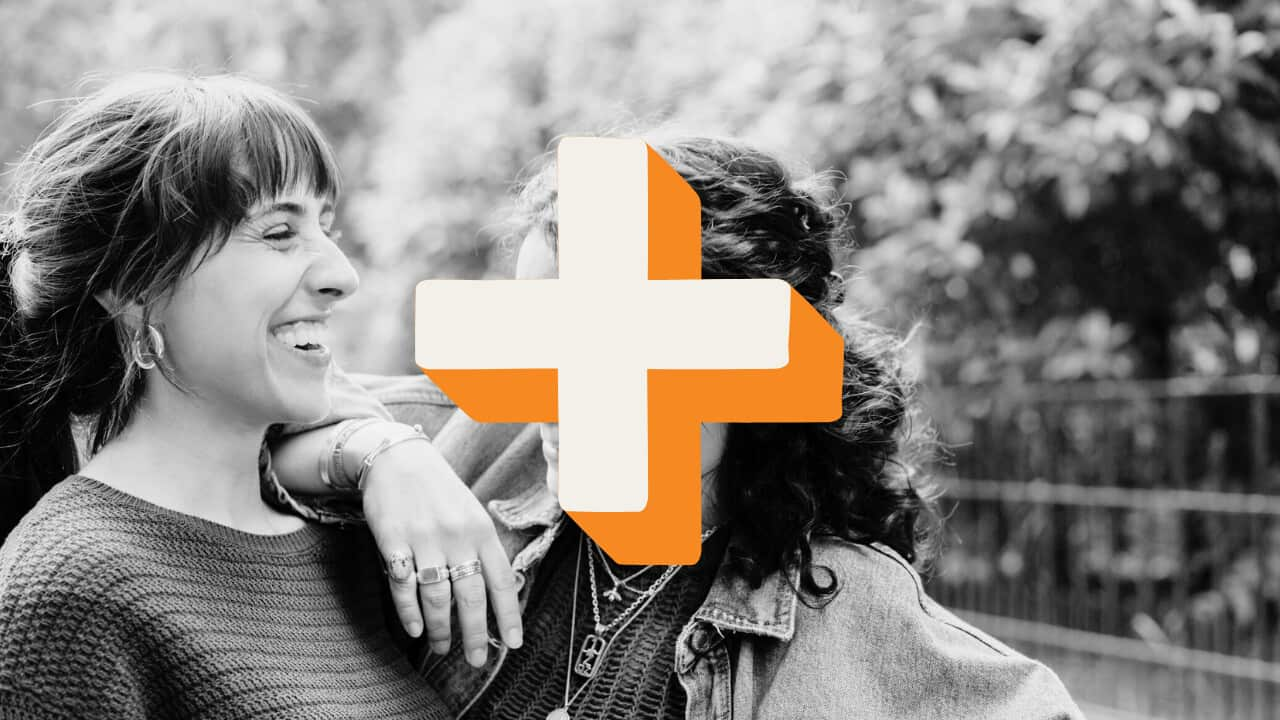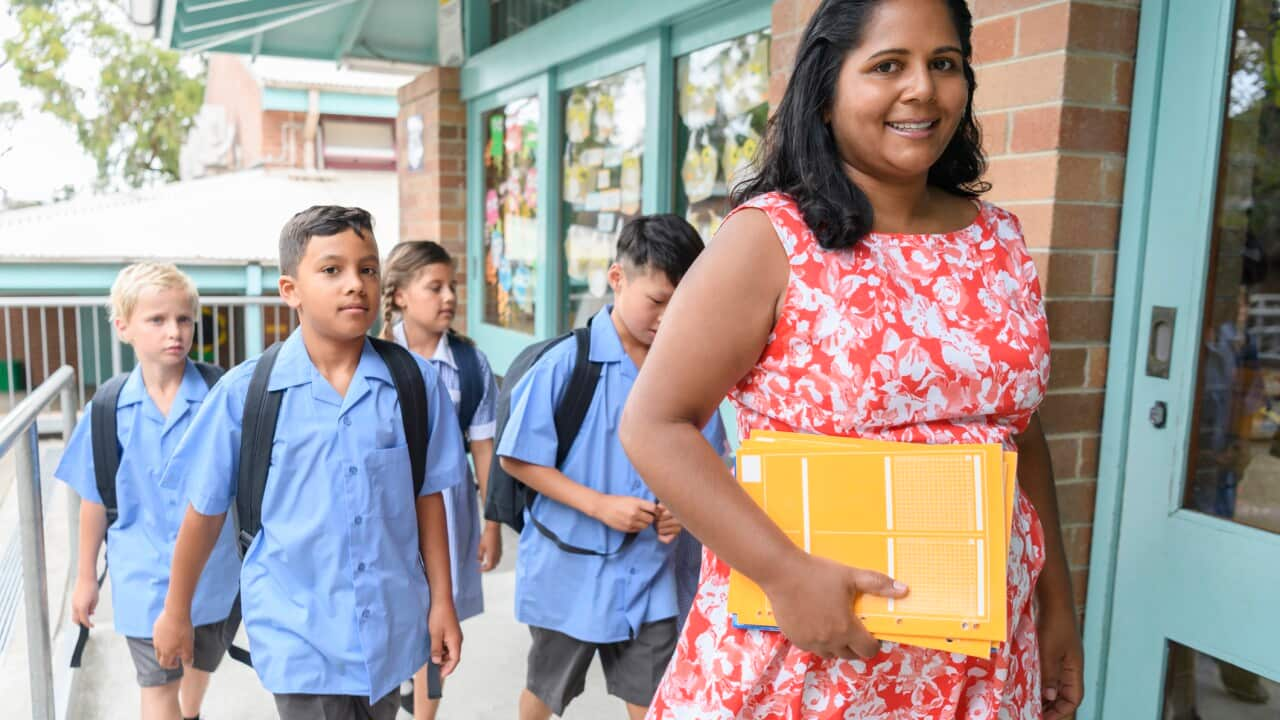SBS Learn English will help you speak, understand and connect in Australia - view all episodes.
This lesson is suitable for intermediate-level learners. After listening, test your knowledge with our quiz.
Learning notes
Examples of phrases you can use when you want to share costs:
- Let’s split it evenly?
- Let split it down the middle.
- Let’s go halves.
- Let’s go halvies
- Let’s split it four ways.
- Shall we each pay the same?
- Can you send me your share?
- You can pay me back later.
- You can pay me back afterwards.
- You can settle up later.
- Can everyone chip in?
- I’ll transfer it straight away.
- You can PayID me your share.
- Please use PayID to send your payment.
Examples of phrases you can use when offering to pay for everyone:
- I can grab the bill.
- I’ll shout this round.
- Let me cover it.
- I’ll take care of it.
- I’ll get this one.
Colloquial expressions:
To foot the bill means to pay for everyone, often when you weren’t expecting to.
Grab the bill means to pay the total bill.
To fork out means to pay for something you don’t really want to pay for. It’s casual and often used humorously when talking about money.
Vocabulary:
To split a bill evenly means to share the total cost equally among everyone.
To chip in is to contribute your share of the cost for something.
To shout usually means to speak loudly, but to shout someone something can also mean to buy them a drink or meal.
PayID is a way to send money using someone’s phone number, email, or ABN instead of their bank account number.
Transcript:
(Note: This is not a word-for-word transcript)
SBS acknowledges the Traditional Custodians of Country and their connections and continuous care for the skies, lands, and waterways throughout Australia.
You’re out for dinner with friends, the food was delicious, and now the bill arrives.
Who pays what? How do you ask for money without feeling awkward? Suddenly, you feel a little nervous. How do you ask about money without feeling uncomfortable?
I’m Josipa, and you’re about to hear a simple, friendly conversation that shows you how you can talk about how to split the bill, chip in, or shout a round. Don’t worry, by the end of this episode, you’ll know all these phrases and more, and you’ll be able to use them with confidence.
Where was I? Oh yes...at a restaurant with Allan and Claire, and the bill has just arrived.
Allan
The bill looks ok. I’m terrible at maths - let's split it evenly?
Claire
Yeah, let’s go halvies. It was mum’s birthday and we all chipped in for a present, so I am a bit short right now. Can I pay my share on pay day?
Allan
Yeah, sure. I can grab the bill now, and you can pay me back.
Claire
Great, I’ll transfer it as soon as I get paid. Do you have PayID?
Allan
Yes. No rush, though. Do you want another drink. Don’t worry, I’ll shout this round. You can shout me next time!
Have you ever paid for your friends, hoping they’d pay you back....and they forgot? That happened to me once, and I ended up footing the bill.
To foot the bill means to pay for the whole bill, often when you weren’t expecting to.
From what we heard from Claire, it doesn’t look like Allan will have to foot the bill this time. As long as she remembers! But let’s start from the beginning. Allan first said,
The bill looks ok. I’m terrible at maths - let's split it evenly!
To split a bill evenly means to share the total cost equally among everyone. You could also say,
Let's split it down the middle.
And that would mean the same thing. We usually use this phrase when two people are sharing the cost. Claire said,
Yeah, let’s go halvies.
Let’s go halvies is another informal way of saying that each person pays half of the total cost.
But let’s say you’re out with three or more people and want to ask them to share the expense. You could say:
Let's split it four ways.
Or
Shall we each pay the same?
Claire also said that it was her mum’s birthday and her family all chipped in for a present.
So. I am a bit short right now. Can I pay my share on pay day?
Claire is ‘a bit short’ meaning she is a little short of money. Are you ever a little short of money until you get paid?
This week, Claire is bit short because she and the rest of her family ‘chipped in’ - that is paid each some money - to get a joint present for her mum.
To chip in means to contributing a joint expense. It doesn’t have to be an equal share. For example, let's say a colleague at work is leaving to go to another job, her work mates might chip in together to buy her a leaving present, but they won’t necessarily all pay the same amount.
You can chip in for things that don’t involve money too. For example, if you go to a party and you stay behind to help with the cleaning up , you could say,
Everyone chipped in to clean up after the party.
Allan then said:
Yeah, sure. I can grab the bill now, and you can pay me back.
Here, ‘grab the bill’ means to pay the total bill. Here, Allan is saying that he will pay for everything now, and Claire can pay her share later.
There are a lot of other ways to say the same thing. For example:
Let me cover it, you can pay me back afterwards.
Claire then said,
I’ll transfer it as soon as I get paid. Do you have PayID?
If you’re transferring the money, you’re sending it immediately using a bank transfer, PayID, or another digital method.
PayID is an Australian payment system which lets you send money using someone’s phone number, email, or ABN instead of their bank account number.
If you are asking someone to send you money using PayID, you can say,
You can PayID me your share.
That’s a casual phrase very commonly used among friends. But if you want to sound more professional, you could say,
Please use PayID to send your payment.
Allan then said:
Do you want another drink? I’ll shout this round. You can shout me next time!
Allan offered to ‘shout this round’ which means to pay for the next round of drinks. A ‘round’ here means a drink for anyone in your group who wants one – in this case, only two people. But be careful, there can be a lot of people in a ‘round’ if you go out with a lot of friends!
It looks as though Claire will be paying for drinks next time they meet.
As I said, there are a lot of ways to say both that you’ll pay for everyone and to ask people to pay later. Here’s another one:
I’ll get this one, you can pay me back later.
As we’ve seen today, splitting the bill can be done in so many ways.
I love all these ways of sharing the cost; just don’t ask me to fork out every time! My budget just can’t handle too much spending.
To fork out means to pay for something you don’t really want to pay for. It’s casual and often used humorously when talking about money.
Sign up for previews, updates and to provide feedback.
Paul Nicholson and Lily O'Sullivan voiced the characters of Allan and Claire, and Professor Lynda Yates was our educational consultant.










